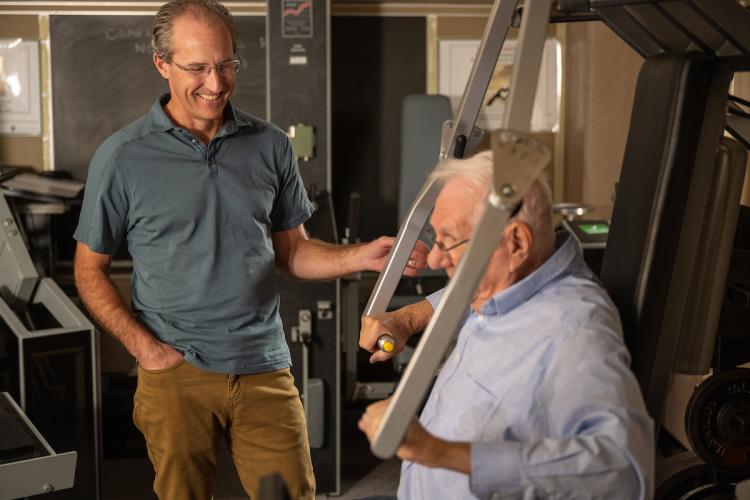
Ohio University’s OMNI researchers lead global rankings with innovative health research

Researchers in Ohio University’s Musculoskeletal and Neurological Institute (OMNI) continue to lead the way in advancing health and science, particularly in the areas of rehabilitation and aging. Their significant contributions have been recognized globally, as highlighted by the latest Scholar GPS rankings, which named many OMNI scientists among the top researchers in their respective fields.
Ten renowned researchers have garnered global scientific acclaim by these rankings, with their lifetime citations placing them within the top 5% of scientists worldwide. This esteemed group includes psychology professors Christopher France and Julie Suhr from the College of Arts and Sciences; Dustin Grooms and Janet Simon from the College of Health Sciences and Professions; and Brian Clark, Leslie Consitt, Graciela Muniz-Terrera, Thomas Rosol, Nathaniel Szewczyk, and Susan Williams from the Heritage College of Osteopathic Medicine.
Notably, France, Clark, Suhr, and Rosol were distinguished as being in the 99.5th percentile in their fields for lifetime citations. Grooms and Muniz-Terrera also achieved the 99.5th percentile based on citations over the past 5-years. France emerges as a top leader in the field of blood donation, boasting a ranking in the top 99.97%, a testament to his contributions that is reshaping this area of study. Such sustained excellence underscores the enduring impact of their research pursuits, regardless of how long they have been working within the field.
"These recognitions are not just numbers; they represent hard work, passion, and a relentless pursuit of knowledge that inspires us all," said Brian Clark, director of OMNI. “In celebrating these accomplishments, we must also recognize the profound impact of their research has on our students and the world, shaping the future of scientific inquiry and innovation.”
Some of OMNI’s more junior scientists were also recognized for their research achievements. Cory Baumann, Nikos Karrayanis, and Shouan Zhu have ascended to the top 10% of scientists globally in the past five years. Baumann and Zhu’s groundbreaking work in skeletal muscle and cartilage research earned them positions in the 97th percentile within their respective sub-disciplines.
At OHIO’s June board meeting, Grooms, the OMNI associate director, highlighted the ways significant contributions of OMNI scientists have advanced health outcomes. He noted that the institute has garnered over $25 million in external grant funding over the past decade, including grants from the National Institute of Health (NIH), the National Aeronautics and Space Administration (NASA), and the Department of Defense.
Grooms also spoke about how his lab is spearheading innovative approaches to rehabilitation through augmented reality, signaling a transformative leap forward in the treatment landscape.
“We are working to integrate advanced technology and research excellence to continue to excel in enhancing neuroplasticity and improving rehabilitation outcomes for patients recovering from orthopedic injuries,” Grooms said.
OMNI, whose mission is to advance the diagnosis, treatment, and prevention of musculoskeletal and neurological disorders, serves as an interdisciplinary catalyst for cutting-edge research. Under the OMNI umbrella are two research centers: OMNI’s Center for Healthy Aging, and OMNI’s Injury and Pain Research Center. Research across these centers aims to develop interventions that enhance physical function and well-being, ultimately reducing disability and pain-related suffering.
The Scholar GPS rankings, developed by Meta Analytics LLC, provide a comprehensive analysis of scholarly activity across academia and beyond. These ranking leverage data mining, machine learning, and data science to establish unique profiles of scholars and institutions globally. The data used for the rankings are based on lifetime or prior five-year activity, weighting each publication and citation by the number of authors and excluding self-citations.
